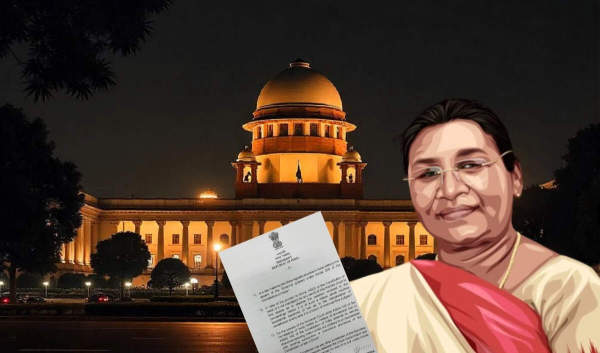
 Can the Supreme Court Define Presidential Authority?
Can the Supreme Court Define Presidential Authority?
Is it within the Supreme Court's jurisdiction to dictate how the President and Governors exercise their powers? Can the Court impose deadlines on the President's actions? These pressing questions have emerged over the past month amidst ongoing discussions about the Supreme Court versus Parliament. Recently, the President of India, Droupadi Murmu, has entered this debate, raising significant inquiries.
Just a day after the new Chief Justice took the oath, President Murmu submitted a list of 14 questions to the Supreme Court. This historic ruling was delivered on April 8, prompting a strong response from President Murmu, who has posed critical questions regarding the Court's authority.
1. What constitutional options exist when a bill is presented to the Governor under Article 200?
2. Is the Governor obligated to act on the advice of the Cabinet?
3. Is the exercise of constitutional discretion by the Governor under Article 200 justified?
4. Can judicial review completely be barred on the Governor's decisions under Article 361?
5. Since there is no time limit set for the Governor in the Constitution, can the Court establish one?
6. Can the President's decisions be challenged in court?
7. Can the Court impose deadlines on the President's decisions?
8. Is it mandatory for the President to seek advice from the Supreme Court?
9. Can the Court hear cases before laws enacted by the President and Governor come into effect?
10. Can the Supreme Court use Article 142 to alter decisions made by the President or Governor?
11. Can laws passed by the state assembly be enforced without the Governor's approval under Article 200?
12. Is it necessary to refer matters related to constitutional interpretation to a five-judge bench of the Supreme Court?
13. Can the Supreme Court issue directives that conflict with the Constitution or existing laws?
14. Is the Supreme Court the sole authority to resolve disputes between the central and state governments?
Under Article 143, the President can seek the Supreme Court's opinion on matters of public interest. The Supreme Court holds original jurisdiction in disputes involving the center and states as per Article 131, and the Court's opinion can also be sought under Article 143(2) in such cases.
According to court regulations, the central government should file a review petition regarding the Tamil Nadu case. Thus, without assessing the merits of the questions, the Court may refuse to provide an opinion on the reference. However, if the reference is accepted, discussions may arise concerning the center-state relationship, federal structure, the powers of the Governor, and the misuse of Article 142.
It is clear from constitutional provisions and various rulings that the Supreme Court's opinion under Article 143 is not binding on the President or the central government.
No, the Supreme Court is not required to give advice. In the Ram Janmabhoomi case, the Court stated that providing opinions on historical and mythological matters does not fall under Article 143. Similarly, in the 1993 Cauvery water dispute, the Court declined to provide an opinion. In 2002, regarding the Gujarat elections, the Court indicated that sending a reference instead of an appeal or review petition was inappropriate.
The first significant case under Article 143 arose from the Delhi Lodge Act of 1951, where the Court provided its opinion. The Court also interpreted references concerning the Kerala Educational Bill of 1957. In 2006, a three-judge bench ruled in the Indore Municipal Corporation case that judicial interference in policy matters decided by Parliament and the central government should not occur.